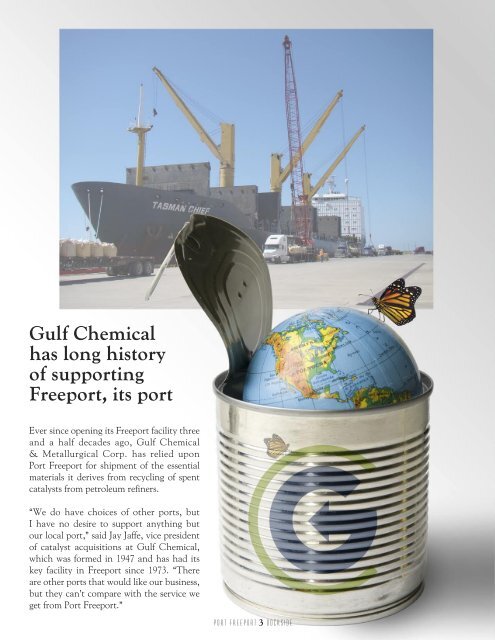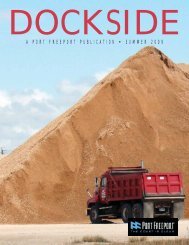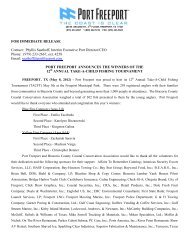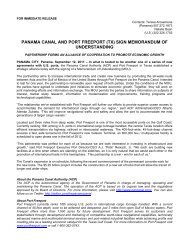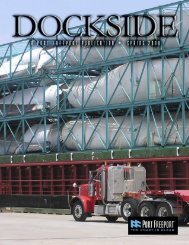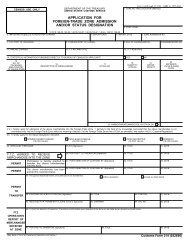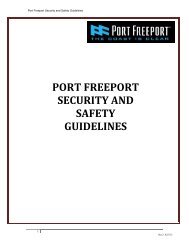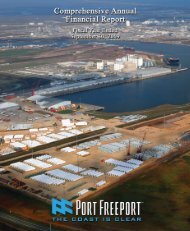Dockside SU2008.indd - Port Freeport
Dockside SU2008.indd - Port Freeport
Dockside SU2008.indd - Port Freeport
Create successful ePaper yourself
Turn your PDF publications into a flip-book with our unique Google optimized e-Paper software.
Gulf Chemical<br />
has long history<br />
of supporting<br />
<strong>Freeport</strong>, its port<br />
Ever since opening its <strong>Freeport</strong> facility three<br />
and a half decades ago, Gulf Chemical<br />
& Metallurgical Corp. has relied upon<br />
<strong>Port</strong> <strong>Freeport</strong> for shipment of the essential<br />
materials it derives from recycling of spent<br />
catalysts from petroleum refiners.<br />
“We do have choices of other ports, but<br />
I have no desire to support anything but<br />
our local port,” said Jay Jaffe, vice president<br />
of catalyst acquisitions at Gulf Chemical,<br />
which was formed in 1947 and has had its<br />
key facility in <strong>Freeport</strong> since 1973. “There<br />
are other ports that would like our business,<br />
but they can’t compare with the service we<br />
get from <strong>Port</strong> <strong>Freeport</strong>.”<br />
P O R T F R E E P O R T 3 D O C K S I D E<br />
The vital metallic materials that Gulf Chemical<br />
exports to Asia from <strong>Port</strong> <strong>Freeport</strong> typically are<br />
transported in 1.5-metric-ton bags, or “super sacks,”<br />
on flatbed trucks that move at the pace of more than<br />
1,000 runs over a three- to four-day<br />
period between Gulf Chemical’s<br />
<strong>Freeport</strong> facility and the dock.<br />
<strong>Port</strong> officials have coordinated<br />
efforts with Gulf Chemical<br />
leaders and other stakeholders in<br />
development and implementation<br />
of procedures that facilitate the<br />
swift movement of these trucks<br />
through port gates and the efficient<br />
loading by stevedores of the cargo<br />
onto oceangoing vessels.<br />
“Gulf Chemical is a local industry<br />
that has gone out of its way<br />
to support its local port with<br />
its exports,” said <strong>Port</strong> <strong>Freeport</strong><br />
Executive <strong>Port</strong> Director/CEO<br />
A.J. “Pete” Reixach, Jr. “We have<br />
worked together to find logistics<br />
solutions, and we’re both enjoying<br />
the rewards of our partnership.”<br />
Gulf Chemical also continues to play<br />
a major role, in conjunction with the<br />
<strong>Port</strong>, in significant community events,<br />
including the annual Take-A-Child<br />
Fishing Tournament that is hosted<br />
by <strong>Port</strong> <strong>Freeport</strong> and the Coastal<br />
Conservation Association - Texas<br />
for which Gulf Chemical has been<br />
a platinum sponsor since the event’s<br />
inception in 2001. Gulf Chemical<br />
also was top-level sponsor of <strong>Port</strong><br />
<strong>Freeport</strong>’s March golf tournament,<br />
which benefited Junior Achievement<br />
of Brazoria County.<br />
Gulf Chemical’s <strong>Freeport</strong> facility,<br />
located just 2 miles from <strong>Port</strong> <strong>Freeport</strong><br />
docks, employs some 175 people in<br />
an around-the-clock operation.<br />
Operations such as those of Gulf Chemical are<br />
instrumental in usefully coupling the increase in<br />
North American oil refining with growing global<br />
demand for steel and related products.<br />
Captain Kovacsik Stefan accepts a maiden voyage plaque from <strong>Port</strong> <strong>Freeport</strong><br />
Managing Director Phyllis Saathoff aboard the M/V Tasman Chief on May 30.<br />
P O R T F R E E P O R T 4 D O C K S I D E<br />
As the world’s largest recycler of spent catalysts<br />
– more than 2 billion pounds since 1973 – from<br />
the oil-refining industry, Gulf Chemical extracts<br />
commodities such as molybdenum, vanadium, nickel<br />
and cobalt. These materials, because<br />
of their high strength and ability<br />
to resist heat and/or corrosion, are<br />
valuable in the making of stainless<br />
steel and various alloys used in<br />
specialty steel, automotive and<br />
foundry industries.<br />
Gulf Chemical is a strong proponent<br />
of numerous recycling initiatives,<br />
from recycling of office paper and<br />
aluminum cans to a new effort to<br />
collect unused hotel amenities and<br />
donate them to local women’s and<br />
homeless shelters and the Texas<br />
<strong>Port</strong> Ministry that serves mariners<br />
calling at <strong>Port</strong> <strong>Freeport</strong>.<br />
Gulf Chemical’s operations are<br />
slated to soon expand to a facility<br />
in Fort Saskatchewan, a suburb of<br />
Edmonton, Alberta, and company<br />
officials are looking at how <strong>Port</strong><br />
<strong>Freeport</strong>’s extensive rail connection<br />
may be used to facilitate links<br />
between the Canadian and Texas<br />
facilities. Company officials also are<br />
looking forward to the opening of<br />
Velasco Terminal containerized<br />
cargo operations at <strong>Port</strong> <strong>Freeport</strong>,<br />
which should play a role in serving<br />
the firm’s European customers.<br />
Gulf Chemical is a subsidiary of<br />
Eramet, a global leader in mining<br />
and metallurgy based in Paris,<br />
France. Eramet has a workforce<br />
of about 15,000 employees in<br />
more than 20 countries on five<br />
continents. The strategy of<br />
sustainable development<br />
using innovation,<br />
investment and<br />
continual improvements in safety<br />
and performance are the benchmarks<br />
that Eramet conveys to its customers,<br />
employees and shareholders.


